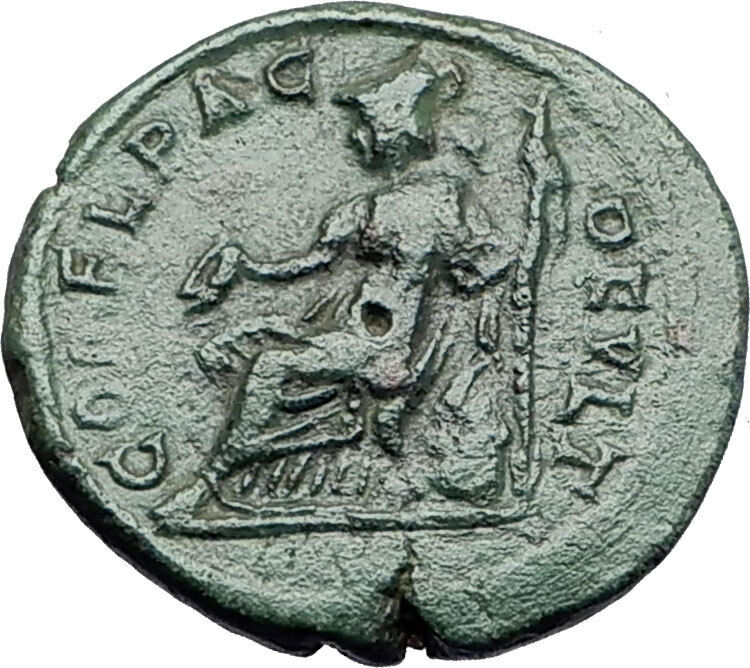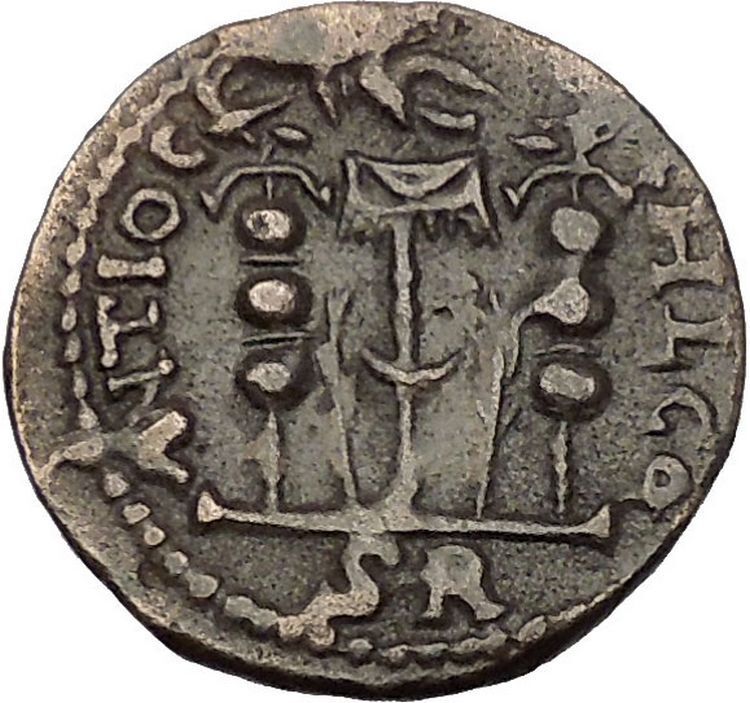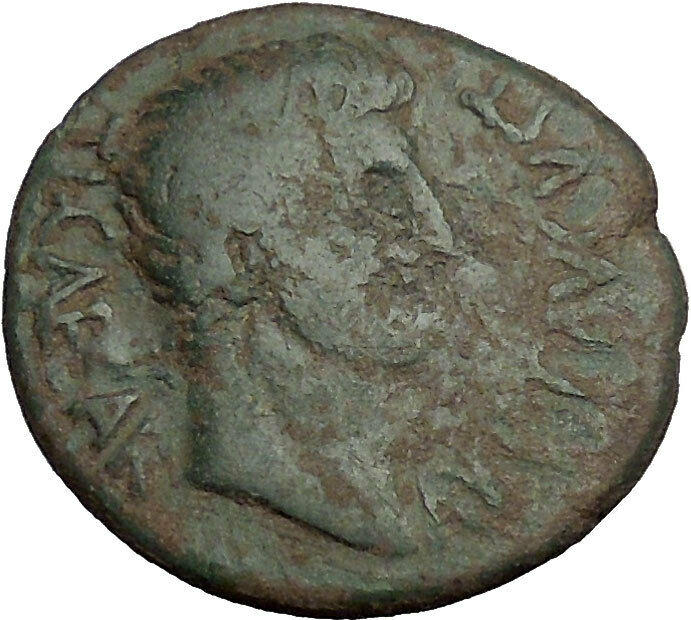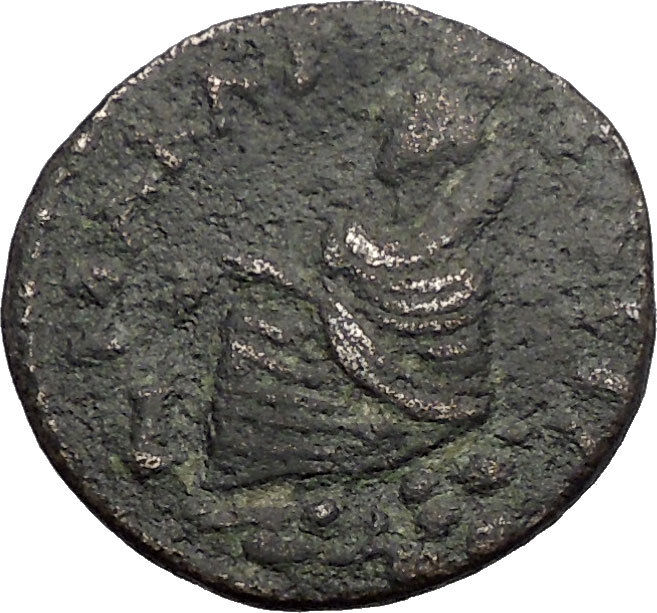|
Gordian III –
Roman Emperor
: 238-244 A.D. –
Bronze 28mm (13.61 grams) of
Nicopolis ad Istrum in Moesia Inferior
under Sabinius Modestus, consular legate
AVT K M ANTΩNIOC ΓΟΡΔΙΑΝΟC●,
Laureate, draped and cuirassed bust right.
VΠ CAB MOΔЄCTOV NIKOΠOΛЄITΩN ΠPOC ICTPON,
Eagle
standing facing on thunderbolt with open wings and head left with wreath in
beak.
You are bidding on the exact
item pictured, provided with a Certificate of Authenticity and Lifetime
Guarantee of Authenticity.
Jupiter is usually thought to have originated as a sky god. His identifying
implement is the
thunderbolt
, and his primary sacred animal is
the eagle, which held precedence over other birds in the taking of
auspices
and became one of the most

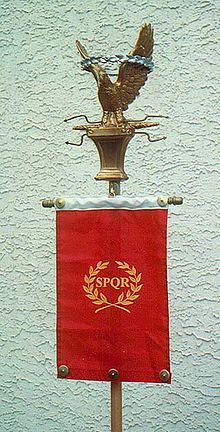 common common
symbols of the
Roman army
(see
Aquila
). The two emblems were often combined to
represent the god in the form of an eagle holding in its claws a thunderbolt,
frequently seen on Greek and Roman coins. As the sky-god, he was a divine
witness to oaths, the sacred trust on which justice and good government depend.
Many of his functions were focused on the
Capitoline
(“Capitol Hill”), where the
citadel
was located. He was the chief deity of
the
early Capitoline Triad
with
Mars
and
Quirinus
. In the
later Capitoline Triad
, he was the central
guardian of the state with
Juno
and
Minerva
. His sacred tree was the oak. The
Romans regarded Jupiter as the
equivalent
of the Greek
Zeus, and in
Latin literature
and
Roman art
, the myths and iconography of Zeus
are adapted under the name Iuppiter.
An aquila, or eagle, was a prominent symbol used in
ancient Rome, especially as the
standard
of a
Roman legion
. A
legionary
known as an
aquilifer
, or eagle-bearer, carried this
standard. Each legion carried one eagle. The eagle was extremely important to
the Roman military, beyond merely being a symbol of a legion. A lost standard
was considered an extremely grave occurrence, and the Roman military often went
to great lengths to both protect a standard and to recover it if lost; for
example, see the aftermath of the
Battle of the Teutoburg Forest
, where the
Romans spent decades attempting to recover the lost standards of three legions.
Nicopolis ad Istrum was a
Roman
and Early
Byzantine
town founded by Emperor
Trajan
around
101–106, at the junction of the Iatrus (Yantra)
and the Rositsa
rivers, in memory of his victory over the
Dacians
. Its
ruins are located at the village of
Nikyup
, 20 km north of
Veliko Tarnovo
in northern
Bulgaria
.
The town reached its apogee during the reigns of Trajan,
Hadrian
, the
Antonines
and the
Severan dynasty
.
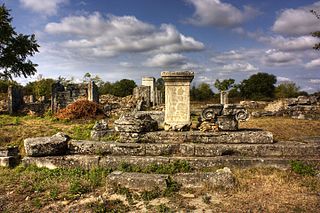
The classical town was planned according to the orthogonal system. The
network of streets, the forum surrounded by an Ionic colonnade and many
buildings, a two-nave room later turned into a basilica and other public
buildings have been uncovered. The rich architectures and sculptures show a
similarity with those of the ancient towns in Asia Minor. Nicopolis ad Istrum
had issued coins, bearing images of its own public buildings.
In
447 AD
, the town was destroyed by
Attila’s
Huns
.
Perhaps it was already abandoned before the early 400s.
In the 6th century, it was rebuilt as a powerful fortress enclosing little more
than military buildings and churches, following a very common trend for the
cities of that century in the Danube area.The largest area of the extensive ruins (21.55 hectares) of the classical
Nicopolis was not reoccupied since the fort covered only one fourth of it (5.75
hectares), in the southeastern corner.
The town became an episcopal centre during the early Byzantine period. It was
finally destroyed by the Avar invasions at the end of the 6th century. A
Bulgarian medieval settlement arose upon its ruins later (10th-14th century).
Nicopolis ad Istrum can be said to have been the birthplace of
Germanic
literary tradition. In the 4th century, the
Gothic
bishop,
missionary and translator
Ulfilas
(Wulfila)
obtained permission from Emperor
Constantius II
to immigrate with his flock of converts to Moesia and settle
near Nicopolis ad Istrum in 347-8.
There, he invented the
Gothic alphabet
and translated the
Bible
from
Greek
to
Gothic
.
Marcus Antonius Gordianus Pius (January
20, 225
–
February
11
, 244
),
known in
English
as Gordian III,
 was was
Roman
Emperor
from 238 to 244. Gordian was the son of
Antonia Gordiana
and his father was an unnamed Roman Senator who died before
238. Antonia Gordiana was the daughter of Emperor
Gordian I
and younger sister of Emperor
Gordian II
.
Very little is known on his early life before becoming Roman Emperor. Gordian
had assumed the name of his maternal grandfather in 238.
Following the murder of emperor
Alexander Severus
in Moguntiacum (modern
Mainz
), the
capital of the
Roman province
Germania Inferior
,
Maximinus Thrax
was acclaimed emperor, despite strong opposition of the
Roman senate
and the majority of the population. In response to what was
considered in Rome as a rebellion, Gordian’s grandfather and uncle, Gordian I
and II, were proclaimed joint emperors in the
Africa Province
. Their revolt was suppressed within a month by Cappellianus,
governor of Numidia
and a loyal supporter of Maximinus Thrax. The elder Gordians died,
but public opinion cherished their memory as peace loving and literate men,
victims of Maximinus’ oppression.
Meanwhile, Maximinus was on the verge of marching on Rome and
the Senate elected
Pupienus
and Balbinus
as joint emperors. These senators were not popular men and the population of
Rome was still shocked by the elder Gordian’s fate, so that the Senate decided
to take the teenager Gordian, rename him Marcus Antonius Gordianus as his
grandfather, and raise him to the rank of
Caesar
and imperial heir.
Pupienus
and Balbinus
defeated Maximinus, mainly due to the defection of several
legions
,
namely the
Parthica II
who assassinated Maximinus. But their joint reign was
doomed from the start with popular riots, military discontent and even an
enormous fire that consumed Rome in June 238. On
July 29
,
Pupienus and Balbinus were killed by the
Praetorian guard
and Gordian proclaimed sole emperor.
Rule
Due to Gordian’s age, the imperial government was surrendered
to the aristocratic families, who controlled the affairs of Rome through the
senate. In 240,
Sabinianus
revolted in the African province, but the situation was dealt quickly. In 241,
Gordian was married to Furia Sabinia
Tranquillina
, daughter of the newly appointed praetorian prefect,
Timesitheus
. As chief of the Praetorian guard and father in law of the
emperor, Timesitheus quickly became the de facto ruler of the Roman
empire.
In the 3rd century, the Roman frontiers weakened against the
Germanic tribes across the
Rhine
and
Danube
, and the
Sassanid
kingdom across the
Euphrates
increased its own attacks. When the Persians under
Shapur I
invaded Mesopotamia
, the young emperor opened the doors of the
Temple of Janus
for the last time in Roman history, and sent a huge army to
the East. The Sassanids were driven back over the Euphrates and defeated in the
Battle of Resaena
(243). The campaign was a success and Gordian, who had
joined the army, was planning an invasion of the enemy’s territory, when his
father-in-law died in unclear circumstances. Without Timesitheus, the campaign,
and the emperor’s security, were at risk.
Marcus Julius Philippus, also known as
Philip the Arab
, stepped in at this moment as the new Praetorian Prefect and
the campaign proceeded. In the beginning of 244, the Persians counter-attacked.
Persian sources claim that a battle was fought (Battle
of Misiche) near modern
Fallujah
(Iraq)
and resulted in a major Roman defeat and the death of Gordian III.
Roman sources do not mention this battle and suggest that Gordian died far away,
upstream of the Euphrates. Although ancient sources often described Philip, who
succeeded Gordian as emperor, as having murdered Gordian at Zaitha (Qalat es
Salihiyah), the cause of Gordian’s death is unknown.
Gordian’s youth and good nature, along with the deaths of his
grandfather and uncle and his own tragic fate at the hands of another usurper,
granted him the everlasting esteem of the Romans. Despite the opposition of the
new emperor, Gordian was deified by the Senate after his death, in order to
appease the population and avoid riots.
|






 common
common
 was
was